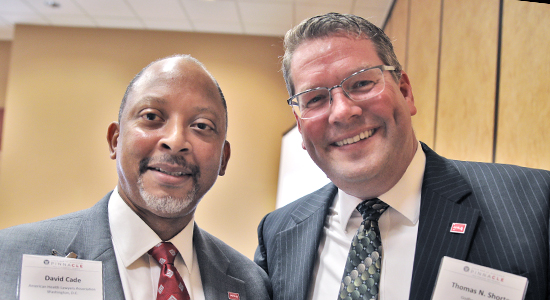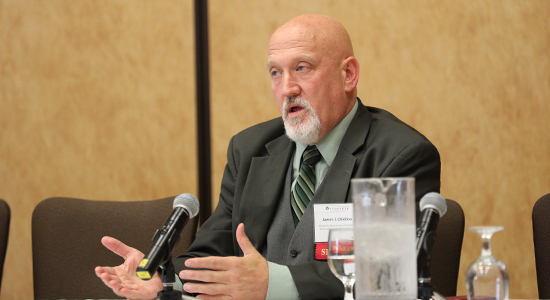
David Cade (left), chief executive officer of the American Health Lawyers Association in Washington, D.C., and Thomas Shorter, chair of the health care team at Godfrey & Kahn, S.C., Madison, gave a health law update.
Visit the State Bar’s Facebook page for more photos of this event, or click here.
Aug. 17, 2018 – How do lawyers influence health care regulations and guidance in the current environment? Administrative advocacy, says David Cade, chief executive officer of the American Health Lawyers Association, which has 14,000 members nationwide.
Cade, based in Washington, D.C., made his third annual appearance at the State Bar of Wisconsin’s two-day Health, Labor, and Employment Law Institute, bringing a national perspective to help health law practitioners navigate the current health care terrain.
“Many organizations have a legislative strategy, where they work with members on the hill,” Cade said. “But in this uncertain environment, where there’s a lot of gridlock in many communities, that strategy is not going to move the needle fast enough. The voice of the provider, the consumer, is best heard through administrative advocacy.”
In addition, Cade said the federal government has limited the use of agency guidance, meaning less guidance for lawyers to rely on when advising clients.

Lillian Cheesman (left), of Summit Law Office LLC in West Allis, and Lisa Cribben, a vendor from Wipfli.
Thus, lawyers can help clients by engaging with the executive branch to share what’s happening in the health care environment, to ensure their clients’ voices are heard.
 Joe Forward, Saint Louis Univ. School of Law 2010, is a legal writer for the State Bar of Wisconsin, Madison. He can be reached by email or by phone at (608) 250-6161.
Joe Forward, Saint Louis Univ. School of Law 2010, is a legal writer for the State Bar of Wisconsin, Madison. He can be reached by email or by phone at (608) 250-6161.
Cade, who worked as deputy general counsel for the U.S. Department of Health and Human Services for 14 years, understand how the government works on these issues.
“I know that the Centers for Medicare and Medicaid Services are very interested in hearing the voice of the provider, and the voice of the consumer,” Cade said. “Currently, they are seeking changes in Stark and Anti-kickback. The agencies do listen.”
For instance, state and federal agencies read comments submitted through the rulemaking process, which influences the positions that are ultimately adopted.
Lawyers can help their clients, at the state and federal level, through messaging their concerns about the regulatory health care environment. “Change is hard, and change is slow, but they do listen,” Cade said. “They can’t hear you if you don’t raise your voice.”

Jim Chiolino, deputy division administrator at the Department of Workforce Development's Equal Rights Division, spoke on the FLSA and Wisconsin law.
Getting Up to Speed
Lawyers convened Aug. 16-17 in Wisconsin Dells to get up to speed on the latest trends, updates, and legal developments in health, labor, and employment law.
From health care cybersecurity to cannabis law, from #MeToo and workplace harassment, to protecting confidential employer data, the 2018 Health, Labor, and Employment Law Institute was action packed with big players and big information.
Employment lawyer Frank Gumina and health care attorney Robin Lehninger, both of Husch Blackwell in Milwaukee, teamed up to discuss the top five legal issues facing health care employers, including mandatory vaccinations and pay disparity.
“The question presented is whether private health care employers can have mandatory vaccination policies. The answer is yes, but they need to be carefully implemented,” Gumina said. “And they need to be carefully administered.”

Robin Lehninger and Frank Gumina, of Husch Blackwell in Milwaukee, discussed the top five legal issues facing health care employers.
Gumina discussed a number of challenges to vaccination policies and how those policies are administered, especially under religious accommodation principles.
Another issue for health care employers is gender pay disparity. “Even though it has been prevalent for a long time, it’s continuing to be a problem,” Lehninger said.
“In the health care industry, gender pay disparity has actually grown. There is more of a gap in compensation between female male physicians,” said Lehninger, who noted that women make up about 50 percent of medical school graduates, currently.
She said there are federal and state laws that prohibit gender discrimination, but more states are starting to pass legislation to strengthen pay equality, including provisions that impose certain factors that organizations must meet to pass the disparity test.
Switching gears, employment lawyers Sally Piefer and Daniel Finerty, both of Lindner & Marsack S.C., in Milwaukee, discussed the protection of confidential employer data before, during, and after the employment relationship with employees.

New Jersey-based attorney Stuart Teicher, gave a dynamic and humorous presentation on bias and inclusion, and how lawyers can effectuate change within their own sphere.
This is a huge issue, Finery said. “It almost seems like a week doesn’t pass where there isn’t a data breach news. Confidential information and trade secrets drive the economy.”
While employer handbooks containing policies on confidentiality are important, Piefer says employers should use written confidentiality and nondisclosure agreements.
“A standalone agreement can include so many more provisions that you cannot include in an employee handbook, such as a fee-shifting provision in the event an employer is successful in proving a breach,” Piefer said.
Stuart Teicher, a self-proclaimed “CLE performer,” took a dynamic and humorous approach to important issues, such as bias and inclusion, to keep attendees engaged.
Teicher, an attorney in New Jersey, talked about how lawyers can execute on promoting inclusion. “I question the effectiveness of using guilt as a motivating tactic,” said Teicher, noting lawyers can effect change within their own personal spheres.
“We can exercise inclusion within our five feet of space,” he said. “What we do in our five feet of space is critical.” That could be speaking up when bias or exclusion occurs around us, or just being cognizant of implicit bias and changing how we act or speak.
Check the WisBar Marketplace in the near future for webcast replays of selected programs from the 2018 Health, Labor, and Employment Law Institute.
